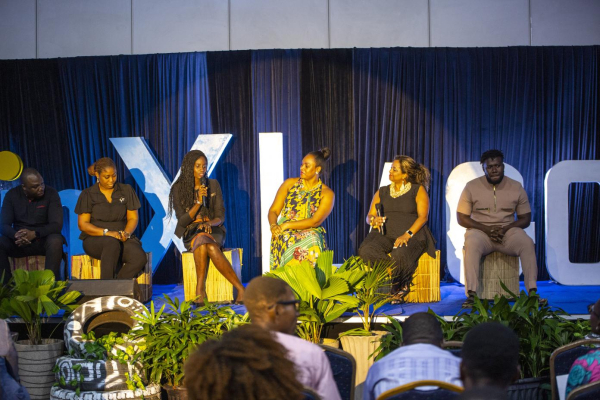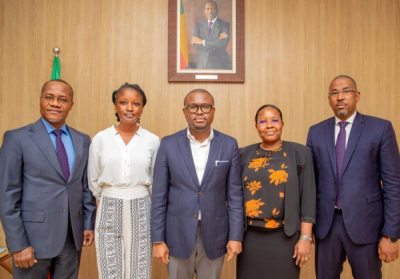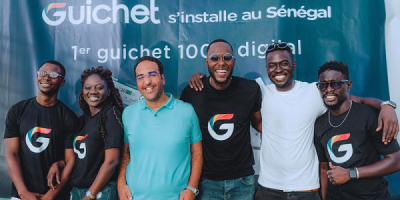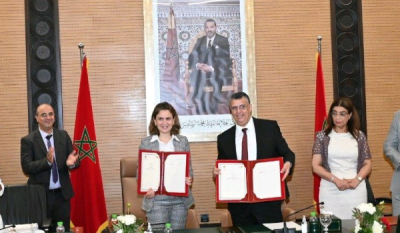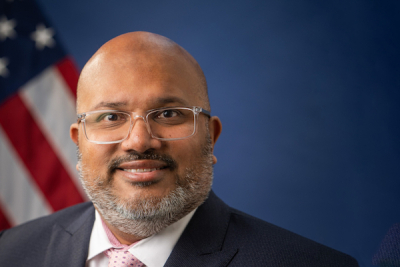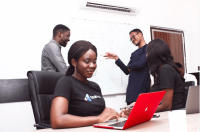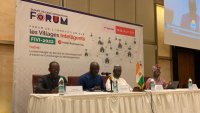
Tech (823)
Despite the ongoing crises and long-standing structural issues, the African startup ecosystem is still thriving. However, it is not yet up to par with the ecosystems in other continents, Europe, and North America namely. The initiative is aimed at helping reach its full potential.
UNDP Africa launched, Wednesday (August 17), timXLAGOS, the Nigerian chapter of Timbuktoo, an initiative aimed at investing US$1 billion of private and public funds to “spur the startup revolution across Africa.”
According to a UNDP release, the aim of Timbuktoo is to “get a lot of private and public sector partners to help set up eight Timbuktoo Hubs in places that are known to have strong startup ecosystems, such as Accra, Nairobi, Cape Town, Lagos, Dakar, Kigali, Casablanca, and Cairo.”
Timbuktoo was initiated in 2021, to contribute to UNDP Africa’s mission to transform the continent by leveraging its population, “especially its ambitious and dynamic youth.” Through the US$1 billion initiative, UNDP plans to help some 1,000 African startups grow significantly over the coming decade.
“The Timbuktoo approach will be based on finding, nurturing, and building African solutions put forward by Africa's youth that directly address one or more of the 17 Sustainable Development Goals (SDGs),” UNDP Africa indicates.
To achieve that goal, the initiative will facilitate the construction of eight private-sector-driven Timbuktoo hubs across Africa. Each of them will focus on a key area -fintech, agritech, Healthtech, Greentech, Creatives, Tradetech and Logistics, Smart Cities and Mobility, or Tourismtech- and host a venture builder and a venture fund.
According to the UNDP release, “Timbuktoo has made significant progress since its inception.” It launched the development of University Innovation Pods (UniPods) in ten “lower-income countries” namely Benin, Chad, Guinea Conakry, Lesotho, Malawi, Mali, Rwanda, Sierra Leone, South Sudan, Togo, and Uganda. The universities will encourage innovation and design thinking. That way, they will prompt the development of strong startup ecosystems in those countries, making them worthy to host Timbuktoo hubs. They are expected to become operational by end-2022, we learn.
For Eleni Gabre-Madhin, UNDP Africa Chief Innovation Officer, “Timbuktoo is a big, innovative, and unique initiative to overcome the present vacuum in early-stage risk capital, to better integrate African innovation stakeholders from universities to corporates to investors, and to enable startups to embrace the African market opportunity.”
Samira Njoya
Over the past five years, the number of start-ups founded and run by women has increased significantly in Africa. But, many problems still hinder the growth of those businesses. Various initiatives are being created by development partners to deal with those problems.
The United Nations Economic Commission for Africa (UNECA) and Venture Building's Betacube program launched an incubation program, Tech African Women (TAW), yesterday (July 28). The program is focused on women-led technology start-ups still in the idea stage. Its first edition will target Ethiopia, Senegal, Tanzania, and Tunisia.
TAW aims to empower female tech innovators, leverage their skills to build strong tech companies from scratch, accelerate the transformation of their project ideas into validated business models, and develop alliances between different African ecosystems.
Applications are open until August 10, 2022, for Tunisia, and August 17, 2022, for Ethiopia, Senegal, and Tanzania at the official address www.techafricanwomen.com. To participate in TAW, applicants must be aged between 18 and 35 and be fluent in English or French.
Tech entrepreneurs selected for the program will take part in a 3-day intensive training and pitch competition organized in partnership with actors from each of their various local tech ecosystems. The winning team from each camp will receive a US$2,000 cash prize.
The top 2 startups from each country will then take part in a 2-month online incubation program to be prepared to enter the market and attract investments.
Later, in December, the top eight startups will take part in a pitching competition to select the best startup, which will win a cash grant of US$7,000.
The deal comes a few days after Benin officially introduced biometric ID cards, canceling the issuance of old cards.
Trade facilitation solution provider Webb Fontaine announced Monday (July 25), a deal with Beninese authorities to implement its Customs Webb solution. The new artificial intelligence-based solution will replace ASYCUDA World, the old IT system used by Benin customs.
The deal is the result of a partnership binding Benin and Webb Fontaine since 2018. According to Alain Hinkati, Director General of Benin Customs, “Customs Webb, Webb Fontaine’s Customs system, based on artificial intelligence, was chosen by Benin to continue the modernization of customs and optimize the trade environment.”
“Webb Fontaine’s ability to provide cutting-edge technology and digital solutions is a guarantee of success. With this new system, the objective of the public authorities to make Benin an exemplary platform in the simplification and transparency of Customs clearance procedures has taken a major step forward,” he added.
The deal to implement Customs Webb follows a decision issued by the Ministerial council on July 6, 2022. It is in line with the government’s ambition to make Benin a model country whose customs clearance procedure is clear and simple.
Customs Webb's main objective will be to interconnect all the main commercial platforms such as the single window, the community port system, and the electronic goods tracking solution.
In January 2018, Webb Fontaine launched the Single Window for Foreign Trade (GUCE), a platform through which pre-clearance and trade inspection documents can be requested.
With Customs Webb, Benin is taking another step toward the digital transformation of its public and private sector. A few days ago, the country officially introduced biometric identity cards, canceling the issuance of the old non-biometric card.
Samira Njoya
In Africa, the digital ticketing system is nascent. However, Morrocan startup Guichet wants to develop it further and conquer the whole of Africa.
Moroccan digital ticketing platform "Guichet" announced, Friday (July 22), the official launch of its Senegalese subsidiary. The new subsidiary, based in Dakar, is the result of a strategic partnership with a Senegalese operator.
For Guichet founder and CEO Ahmed Tawfik Moulnakhla, Senegal is a strategic market. "Morocco and Senegal are sister countries, whose exemplary relations embody an ambitious and inspiring model of South-South cooperation. By setting up [its subsidiary] in Dakar, Guichet wants to contribute to the exceptional dynamism of Senegal’s culture and entertainment industries by providing the public with smart ticketing solutions developed in Morocco,” he said.
Guichet, which has been operating in the Moroccan market for three years now, just passed the mark of one million tickets sold online. This is an unprecedented performance in the Moroccan entertainment industry. The ticketing platform wants to replicate this performance in the Senegalese market, which is its first step out of its native country, Morocco.
The Senegalese subsidiary is a test for Ahmed Tawfik Moulnakhla who wants to conquer the whole of Africa in the coming years.
Despite a difficult start, over the years, Guichet has managed to gain the trust of the Moroccan public by offering them the possibility to buy tickets online. The platform, which has Android and iOS apps, offers the possibility to buy tickets for concerts, sporting events, festivals, etc. In Morocco, it has organized more than 2,000 events.
Samira Njoya
Morocco embarked on a digital transformation journey years ago. Thanks to the various partnerships and agreements it has already signed, the country expects to digitize all of its public services by 2025.
In Morocco, the Ministry of Justice is moving to accelerate its digital transformation. Indeed, on Friday, July 22, in Rabat, Justice Minister Abdellatif Ouahbi signed a memorandum of understanding with the Ministry of Digital Transformation, represented by Digital Minister Ghita Mezzour.
In the framework of that memorandum, the Ministry of Digital Transformation will offer technical assistance for the implementation of the Ministry of Justice’s digital projects. The two ministries will also share experience and collaborate on human resource development. Notably, the memorandum will oversee the interconnection of the Ministry of Justice’s digital platforms and allow the Ministry of Justice to use digital participatory platforms.
According to Abdellatif Ouahbi, the digital transformation of the Ministry of Justice is a strategic move aimed at rendering its services more accessible to users. “In the coming months, the Ministry will redesign its websites and digitize its justice services,” he said. He explained that with digitalization, the justice system will be accelerated since data can now be securely exchanged in real-time between departments.
The acceleration of the Ministry of Justice’s digital transformation is in line with the country’s digital transformation strategy (Maroc Digital 2020 and 2025) launched in 2016. The national digital transformation strategy aims to reduce the divide. Its ambition is to digitize at least 50% of administrative procedures and connect at least 20% of Moroccan SMEs to the internet by 2025.
As Minister Ghita Mezzour explains, in its new development model, Morrocco considers the digitization of public services a tool to improve economic, social, and territorial integration.
Samira Njoya
Over the past four years, Africa's startup industry has attracted significant investors. The number of innovations developed is growing with beneficial impacts on the lives of millions of people. Several tech solutions developed by African startups have gained international recognition.
African startups have developed a fantastic ecosystem, according to Arun Venkataraman, the U.S. Assistant Secretary of Commerce for Global Markets. Speaking during an exclusive interview, with Ecofin Agency, before the next US-Africa Leaders Summit, the official revealed his country’s admiration of the digital ecosystems developed by African countries.
“The fantastic ecosystems developed by startups in countries like Nigeria and Kenya as well as the innovations that have come out of them” meet the expectations of the creative and forward-looking African youth, who are the core of the demographic dividend, he said.
"If this dynamic is carefully backed by the right policies, it can lead to great success and greater innovation that will benefit every one of us," he emphasized
Arun Venkataraman estimates that digital technology is one of the sectors where Africa and Africans can contribute a lot to their trade relationship with the U.S. "The U.S is looking forward to the innovations and new ideas contributed by Africans. We see Africa not only as a consumption market for U.S. goods and services but also as a key provider of the goods and services the United States needs,” he told Ecofin Agency.
Over the past four years, Africa's start-up industry has indeed undergone a profound transformation. The number of innovative companies created on the continent has increased. The volume of investments they attracted has gone up as well, following a sharp uptrend. According to Partech, African startups attracted US$1.16 billion in 2018. By 2021, that volume rose to US$5.2 billion. Investors committing funds to those innovative companies include American companies such as Bezos Expeditions, Visa, PayPal, Sequoia Capital, and LeapFrog.
For Arun Venkataraman, given the dynamism of its startup ecosystem, “Africa is much more than a commodity market. Even though we have to help it develop strong value-added sectors, we admire the successful ventures noticed because they add value to the U.S., but also the global market as a whole.”
Muriel Edjo
Over the past five years, there has been a steep rise in the volume of investments secured by African startups. All through those years, Nigeria has almost always been the country attracting the most startup investment. Authorities now want to enhance those startups’ capabilities with a dedicated legal framework.
The Nigerian Senate passed Wednesday (July 20), a startup bill first drafted in June 2021. With its bill passing the Senate review, the national startup ecosystem is getting closer to its goal of ensuring “that Nigeria's laws and regulations are clear, planned, and work for the tech ecosystem.” The two steps remaining are validation by the House of Representatives and the signature of the President of the Republic.
The main objectives of the bill are "to provide a legal and institutional framework for the development of startups in Nigeria and to provide an enabling environment for the establishment, development, and operation of startups in Nigeria; Foster the development and growth of technology-related talent and position Nigeria's startup ecosystem as the leading digital technology hub in Africa, having excellent innovators with cutting edge skills and exportable capacity.”
Currently, Nigerian start-ups attract the most investment in Africa. They are thriving thanks to a long battle fought by the private sector. Nowadays, analysts point to their contribution to economic growth in the current digital age, and public authorities are determined to provide a better framework for their development.
In its nascent start-up bill, Nigeria has provided several facilities that will help accelerate the maturation of startups. The facilities include a label entitling to tax incentives, financial facilities through a dedicated seed fund, and customs facilities as well as training.
Once the bill is passed, Nigeria will join the list of the few African states that have adopted specific startup regulations. These include Senegal, Tunisia, and Mali.
Muriel Edjo
The Covid-19 pandemic accelerated digital transformation in most African countries. Nowadays, investments that were previously concentrated in urban areas are increasingly channeled to the development of rural areas, which house most of the population.
Nigerien Minister of Posts and Telecommunications, Hassane Baraze Moussa, presided over the launch of the first edition of the Smart Village Innovation Forum (FIVI) last Monday. The forum, which will be concluded tomorrow (July 22), serves as a framework for reflection on rural areas’ digital transformation. Its theme is “Tec4Dev through Carpooling for Development.”
According to Minister Hassane Baraze, the end goal of the reflections will be to help materialize the government’s commitment “to connecting the rural areas by supporting state institutions and agencies.” It will also help “achieve the state agencies and institutions’ strategies, and end the digital isolation of Niger’s administrative villages.” The reflection is also expected to help “promote the use of e-services in urban and rural areas to notably improve financial inclusion, as well as create an ecosystem that is conducive to the development of local digital content and facilitates support to local startups.”
The plan currently set in motion for the digital transformation of rural areas in Niger is in line with the government’s commitments in its Renaissance Program Act III. The program notably provides for the modernization of rural areas by developing production and human capital as well as improving financial inclusion. By leveraging information and communication technologies, the country can quickly reach those goals.
In 2021, the country’s internet penetration rate was around 30% with low public services digitization scores. According to UN data, in 2020, it was among the countries with the lowest e-governance index, ranking 188th out of 193 countries. Developing broadband connectivity that supports digital services and information is one of the key requirements for the government of Niger to realize its "smart villages" ambition.
Niger "has a predominantly young population living in rural areas. [..] Our youth are our main asset. By training them and allowing them access to information, we will create better conditions to achieve our development objectives,” said Hassane Baraze Moussa.
Adoni Conrad Quenum
Despite the ongoing digital revolution, Africa’s higher education still faces a certain number of challenges. They include access to documentation. However, multifunctional centers are being built to overcome the challenges.
The World Health Organization (WHO) inaugurated, Friday (July 15), a digital information center in Brazzaville, Republic of Congo. The infrastructure was inaugurated by Health Minister Gilbert Mokoki during a ceremony attended by Dr. Lucien Alexis Manga, the WHO resident representative in Congo.
The center is aimed at facilitating access to the documentary resources published by the WHO on its information platforms.
"The digital information center will facilitate exchanges between health professionals. It has several rooms, some of which are reserved for WHO teams and their partners. It also has a twenty-workstation multipurpose room that can facilitate online training,” said Dr. Lucien Alexis Manga.
The newly inaugurated infrastructure will promote research and higher education in Congo. It will also serve as a digital library with a collection of audio and video documents that can be accessed remotely. "We formerly had huge libraries that were difficult to peruse. With the [digital information center] initiative, everything is summarized and can be read easily and fast. The initiative must be shared at will so that [the center] can inspire others,” commented Gilbert Mokoki.
The center, equipped with broadband internet, adds to ARCAI, an artificial intelligence research center funded by the UNECA and its partners. The research center was inaugurated in Brazzaville last February.
Samira Njoya
There is a growing number of coding and digital training programs in Africa. The said programs aim to equip the youth with ICT skills that render them competitive in the digital economy.
Last Friday, July 15, on the sidelines of the World Youth Skills Day, the African Development Bank (AfDB) announced the selection of 500 Coding for Employment digital ambassadors “who will lead a peer-to-peer training model.”
The selected digital ambassadors will undergo three months of training in digital skills such as software development, problem-solving, project management, and communication. At the end of the training, they will receive ICT toolkits to “offer the same training” in their local communities to allow access to digital skills for more Africans, in rural communities with limited internet connectivity notably.
For this first edition of the digital ambassador program, AfDB (through its Coding for Employment) and its technical partner Microsoft, received 21,000 applications from all over Africa. In the end, 500 young people from four countries where the AfDB's Coding for Employment program is operational were selected. Those countries are notably Côte d'Ivoire (75 selected), Kenya (100), Nigeria (150), and Senegal (175).
“We are delighted by the enthusiasm and the passion the candidates have shown for the program. We have sifted through all the applications to identify candidates whose backgrounds and qualifications closely match the selection criteria. The 500 candidates will not only acquire skills that can help them find work but will also be able to create their jobs while also training others," said Hendrina Doroba, the AfDB’s Head of Education and Skills Development.
Coding for Employment, launched in 2018, is one of AfDB’s programs to achieve the goals of its Jobs for Youth in Africa (JfYA) Strategy. It aims to enable the youth “to bring about economic and social transformation in the digital age.”
With the JfYA strategy, the AfDB wants to create 25 million jobs in key sectors and increase the employability and entrepreneurial success of some 50 million young people by training them in hard and soft skills.
Samira Njoya
More...
Water scarcity affects 40% of the world's population. To address the situation, the United Nations Office for Outer Space Affairs developed the World Hydrological Cycle Observing System (WHYCOS), which uses satellite technology to improve “basic observation activities,” strengthen international cooperation and promote free data exchange in the hydrogeology sector.
Ghana will use space technology to monitor and protect its water resources. The plan was announced by Ghanaian vice-president Mahamudu Bawumia, last Thursday (July 14), while addressing the 5th International Conference on the use of space technology for water resources management (the conference ended on Sunday, July 17).
“Water resources management is an integral part of national development and there is an avenue for space technologies to be used to monitor and evaluate water resources,” he said.
According to the government official, water resource management is a pressing issue for Ghana, whose abundant water resources are threatened by human activities. He indicated that the government would soon pass the Ghana Space Policy, which would expand the missions of the Ghana Space Science and Technology Institute (GSSTI). The new policy will transform the GSSTI into a full-fledged space agency that will leverage space technology to improve the efficiency of the national fight against uncontrolled exploitation, which affects the quality of its water resources.
According to USAID and Sustainable Water Partnership, “Ghana has abundant water resources and is not considered water-stressed overall.” However, the resources are increasingly threatened by activities like illegal gold mining that contaminate municipal water sources with heavy metals, particularly in the Pra Basin. Municipal, domestic and industrial wastes also contaminate 60% of surface waters and degrade ecosystems and biodiversity, especially downstream of Kumasi and Accra.
By protecting its water resources, the government wants to guarantee their quantity and quality but also avert water shortages. It will also reduce the financial resources needed to treat water for mass consumption.
Samira Njoya
The tech sector is booming in most African countries. To improve its impact on the continent, two countries have decided to join forces and conquer other markets.
Rwandan technology park kLab and Gabon Digital Incubation Company (SING S.A) plan to develop an exchange program. For that purpose, last Wednesday (July 13), kLab’s general manager Yeetah Kamikazi (photo, right) and Yannick Ebibie Nze (photo, left), CEO of SING S.A, signed a partnership agreement. The exchange program aims to support the two countries’ startup ecosystem and financing sources to quickly achieve conclusive results.
Under the terms of the agreement, SING S.A. (which has already incubated 53 startups, including eight with tremendous growth) will facilitate the exchange program development.
“We can build on the results achieved by kLab as a non-profit organization in Rwanda over the past few years. In Gabon, we have a different model [Ed. note: SING S.A is a for-profit organization] and I believe it will be great for kLab to also find ways to secure additional financing outside traditional sources like the government and international partners,” explained Yannick Ebibie Nze.
For Yeetah Kamikazi, the Gabonese market is a prospective market for Rwandan startups, given the small size of her local market. She also added that Gabon needs Rwanda’s expertise in the e-transport and e-governance sectors.
In Rwanda, the government is committed to making the country an African IT hub. Also, for years now, Kigali has been the host of the tech hubs of major international firms. In December 2021, coworking space and investment fund Norrsken Foundation launched an entrepreneurship hub in Kigali, to welcome 1,000 entrepreneurs by the end of 2022. To date, the country’s startups have raised US$23 million, including US$17 million in 2021.
Adoni Conrad Quenum
Africa has the lowest internet penetration rate with just 22% of its population currently connected. To remedy the situation, countries are implementing various projects.
The African Development Bank (AfDB) and the common Eastern and Southern market COMESA signed an agreement letter last Wednesday (July 13). According to a release published by COMESA, the agreement letter concerns a US$550,000 grant to be provided by AfDB to fund the feasibility studies of COMESA’s Africa Cloud Ecosystem (ACE) project.
According to the release, the AfDB grant will “support the first phase; Market Analysis (Pre-investment study) which will assess the market for the ACE project and examine the bankability of the project including testing of the concept in the COMESA region.”
For AfDB Zambia country manager, Dr. Raubil Durowoju, “the Africa Cloud Ecosystem project will be a first of its kind, laying the foundation to facilitate the African continent to undertake this shift in the key sectors of the economy: education, government, agriculture, and health through the provision of a reliable ecosystem of datacentres.”
It aims to contribute to the installation of a state-of-the-art facility that will provide essential and sustainable ICT infrastructure services to the 21 COMESA member states and the African continent as a whole.
It is also expected to facilitate regional integration by taking full advantage of technology and laying the foundation for a duty-free and quota-free zone “which goes beyond the data-only aspects.” Its development should also “increase the sustainability and viability of information and provide a pivotal way of transitioning Africa’s community into a digital economic community.”
“Besides significantly lowering the cost for hosting services, identified as the main reason African businesses host their services overseas, the project will also remove barriers faced by African enterprises by promoting intra-regional trade and boosting innovation,” COMESA explains.
Once launched, ACE will improve Africa’s positioning in the global ICT landscape.
For COMESA secretary-general Chileshe Kapwepwe, once completed, the project will “enhance competitiveness by fostering regional connectivity and deepening continental integration.”
Samira Njoya
The e-visa platform aims to facilitate visa application processes, rendering the country attractive.
Togo announced, Monday (July 11), that it has updated and re-launched “Togo Voyage,” its digital visa issuance platform. Unlike its previous version launched in August 2020, the new platform now integrates an online visa application and Covid-19 processes, greatly facilitating the application process.
“I am pleased with the Voyage Togo platform because it is revolutionizing our work methods. We now have access to a unique and virtual database of travelers coming in and moving out of the country, making it a hundred times faster to process and allowing our national security services to deliver more efficiently,” commented Minister of Security and Civil Protection Yark Damehame.
The platform, available in French and English, also offers travelers the possibility to store their data in user accounts to avoid entering them again for every application.
Payments have also been fully digitized (either via bank cards or mobile money) while cash payment is simply prohibited.
The e-visa project is one of the many reforms on the Togolese government’s 2025 agenda. A few months ago, the government announced the digitization of every public service to become more conducive to business operations and provide efficient public services to the population.
The new version of Togo Voyage was developed by Togo Digital Agency (ATD), and created by the government to steer the country’s digital transformation process. By the end of this year, the platform will be extended to include land and sea borders.
Samira Njoya


